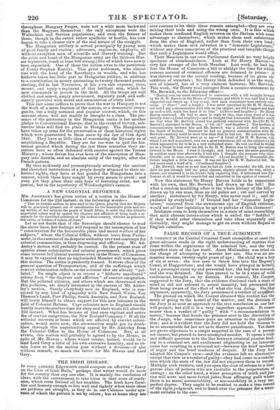FALSE RECORD OF A TRUE JUDGMENT.
A VERDICT at the Central Criminal Court exemplifies at once the great advance made in the right understanding of matters that come within the cognizance of the criminal law, and the very imperfect state of the law itself. Anne Mallandine was tried on the charge of attempting to murder her son. She was an un- married woman, twenty-eight years of age; the child was a boy of six or seven : she was seen to throw him into the Regent's Canal, at Haggerstone; and she would have plunged in herself, but a passenger came up and prevented her ; the boy was rescued, and she was detained. She then proved to be in a state of wild excitement, brought on by distress. Her counsel, Mr. Cooper, suggested to the Jury, that the evidence disclosed such a state of mind as did not amount to actual insanity, but prevented her from being aware of the effect of what she was doing. On that argument, apparently, the Jury pronounced a verdict of actplittal. The ground on which Mr. Cooper obtained this verdict his the merit of going to the kernel of the matter; and the decision of the Jury is as near an approach to the true conclusion as our law will permit; but still it is a very imperfect approach. It comes nearer than a verdict of " guilty " with "a recommendation to mercy," because that hands the prisoner over to the discretion of the Judge, who sometimes pays no attention to the qualifica- tion; and it is evident that the Jury did not hold the woman to be so accountable for her act as to deserve punishment. Yet there are grave objections to a simple acquittal in the case of a person not insane, but proved to have attempted murder. It opens a wide and difficult question as to the line between criminal passion lead- ing to a criminal act and excitement originating in an innocent cause but resulting in a criminal act—between the brief madness of anger and the brief madness of despair. If the Jury had adopted Mr. Cooper's view—and the evidence left no alternative except that view or a verdict of guilty—they had come to a conclu- sion which the state of the, law did not empower them to record. Multiply such verdicts, and you open the door of release to a dan- gerous class of persons who are excitable to the perpetration of outrage : on the other hand, a wiser perception of truth and jus- tice will more and more forbid juries from affirming guilt where there is no moral accountability, or accountability in a very im- perfect degree. They ought to be enabled to make a true record of the right judgment, and to hand over the prisoner for a treat- ment suitable to the case.


























 Previous page
Previous page